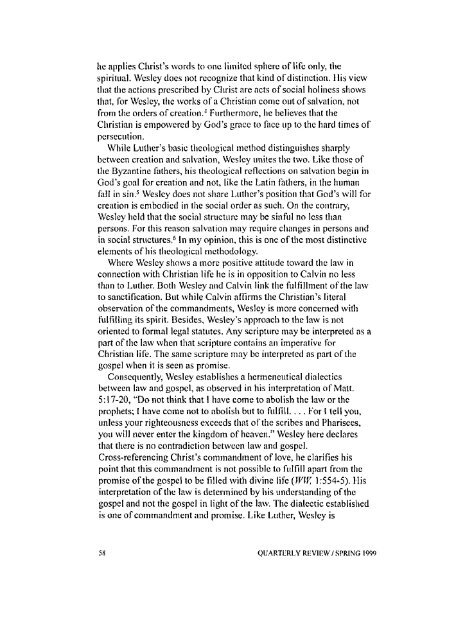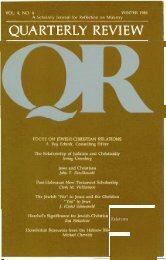Spring 1999 - Quarterly Review
Spring 1999 - Quarterly Review
Spring 1999 - Quarterly Review
You also want an ePaper? Increase the reach of your titles
YUMPU automatically turns print PDFs into web optimized ePapers that Google loves.
he applies Christ's words to one limited sphere oflife only, thespiritual. Wesley does not recognize that kind of distinction. His viewthat the actions prescribed by Christ are acts of social holiness showsthat, for Wesley, the works of a Christian come out of salvation, notfrom the orders of creation. 4Furthermore, he believes that theChristian is empowered by God's grace to face up to the hard times ofpersecution.While Luther's basic theological method distinguishes sharplybetween creation and salvation, Wesley unites the two. Like those ofthe Byzantine fathers, his theological reflections on salvation begin inGod's goal for creation and not, like the Latin fathers, in the humanfall in sin. 5Wesley does not share Luther's position that God's will forcreation is embodied in the social order as such. On the contrary,Wesley held that the social structure may be sinful no less thanpersons. For this reason salvation may require changes in persons andin social structures. 6In my opinion, this is one of the most distinctiveelements of his theological methodology.Where Wesley shows a more positive attitude toward the law inconnection with Christian life he is in opposition to Calvin no lessthan to Luther. Both Wesley and Calvin link the fulfillment of the lawto sanctification. But while Calvin affirms the Christian's literalobservation of the commandments, Wesley is more concerned withfulfilling its spirit. Besides, Wesley's approach to the law is notoriented to formal legal statutes. Any scripture may be interpreted as apart of the law when that scripture contains an imperative forChristian life. The same scripture may be interpreted as part of thegospel when it is seen as promise.Consequently, Wesley establishes a hermeneutical dialecticsbetween law and gospel, as observed in his interpretation of Matt.5:17-20, "Do not think that I have come to abolish the law or theprophets; I have come not to abolish but to fulfill.... For I tell you,unless your righteousness exceeds that of the scribes and Pharisees,you will never enter the kingdom of heaven." Wesley here declaresthat there is no contradiction between law and gospel.Cross-referencing Christ's commandment of love, he clarifies hispoint that this commandment is not possible to fulfill apart from thepromise of the gospel to be filled with divine life (WW, 1:554-5). Hisinterpretation of the law is determined by his understanding of thegospel and not the gospel in light of the law. The dialectic establishedis one of commandment and promise. Like Luther, Wesley is58 QUARTERLY REVIEW / SPRING <strong>1999</strong>












